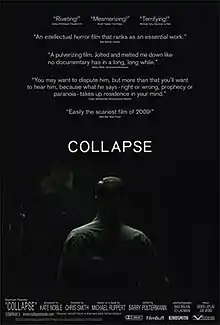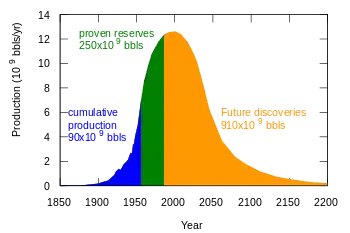Collapse (film)
Collapse, directed by Chris Smith, is an American documentary film exploring the theories, writings and life story of controversial author Michael Ruppert. Collapse premiered at the Toronto International Film Festival in September 2009 to positive reviews.
| Collapse | |
|---|---|
 Theatrical poster | |
| Directed by | Chris Smith |
| Produced by | Chris Smith Kate Noble |
| Starring | Michael Ruppert |
| Music by | Didier Leplae Joe Wong |
| Cinematography | Ed Lachman Max Malkin Chris Smith |
| Edited by | Barry Poltermann |
| Distributed by | Vitagraph Films |
Release date |
|
Running time | 82 minutes |
| Country | United States |
| Language | English |
Overview
Ruppert, a former Los Angeles police officer who describes himself as an investigative reporter and radical thinker, has authored books on the events of the September 11 attacks and of energy issues. Critics in the mainstream media and in D.C. called him a conspiracy theorist and an alarmist.
Director Smith interviewed Ruppert over the course of fourteen hours in an interrogation-like setting in an abandoned warehouse basement meat locker near downtown Los Angeles. Ruppert’s interview was shot over five days throughout March and April 2009. The filmmakers distilled these interviews down to this 82 minute monologue with archival footage interspersed as illustration.
The title refers to Ruppert’s belief that unsustainable energy and financial policies have led to an ongoing collapse of modern industrial civilization.
Critics have variously described the film as supportive and as critical of Ruppert’s views. Smith himself, speaking at the Toronto International Film Festival premiere, said that "What I hoped to reveal was ... that his obsession with the collapse of industrial civilization has led to the collapse of his life. In the end, it is a character study about his obsession."[1]
Synopsis
Sitting in a room that looks like a bunker, Ruppert briefly recounts his life including his parents' ties to U.S. intelligence agencies and Ruppert’s own career as an LAPD beat cop and detective. Ruppert then summarizes current energy and economic issues, focusing mainly around the core concepts of peak oil and sustainable development. He also criticizes fiat money, fractional reserve banking, compound interest, and leveraging, and discusses alleged CIA drug trafficking.
The bulk of the film presents Ruppert making an array of predictions including social unrest, violence, population dislocation and governmental collapses in the United States and throughout the world. He draws on news reports and data available via the Internet, but he applies a unique interpretation which he calls “connecting the dots”.
Smith periodically stops Ruppert to question his assumptions and provide a note of skepticism.
Critical reception
After its premiere at the Toronto Film Festival, Owen Gleiberman of Entertainment Weekly called Collapse “one of the few true buzz films of the festival” and wrote that “you may want to dispute [Ruppert], but more than that you’ll want to hear him, because what he says — right or wrong, prophecy or paranoia — takes up residence in your mind.”[2]
Daily Variety wrote that Collapse was “unnervingly persuasive much of the time, and merely riveting when it's not, Ruppert's talking-head analysis gets the Errol Morris treatment from director Chris Smith (American Movie), whose intellectual horror film ranks as another essential work.”[3]
The Onion's A.V. Club wrote that "in several immensely poignant moments, we can also see an angry, lonely, vulnerable man whose life epitomizes the title as much as the globe does. There are many layers to the man and the movie, and I for one left the theater shaken."[4]
Roger Ebert wrote, "I don't know when I've seen a thriller more frightening. I couldn't tear my eyes from the screen. "Collapse" is even entertaining, in a macabre sense. I think you owe it to yourself to see it."[5]
Distribution
In October 2009 the filmmakers announced that Collapse would premiere simultaneously in theaters in New York City and via video on demand on November 6, 2009.[6] According to press announcements, this unique release arrangement “will mark the first time a film will be released this soon after it premiered at a festival without distribution.”
See also
References
- "Forbes "Apolcolypse now? Dark visions at Toronto film festival"". 2009-09-14. Archived from the original on 2012-01-18. Retrieved 2009-10-20.
- "Toronto Buzz: 'COLLAPSE showcases gripping pundit of economic doom". Entertainment Weekly. Archived from the original on 2009-09-23. Retrieved 2009-10-20.
- Nelson, Rob (2009-09-17). "Daily Variety Review: "Collapse"". Variety. Retrieved 2009-10-20.
- "The Onion's A.V. Club "Toronto Film Festival '09: Day 4"". Retrieved 2009-10-20.
- "Roger Ebert Movie Reviews "Collapse"". Chicago Sun-Times. Retrieved 2009-12-17.
- "IndieWire "Chris Smith's "Collapse" Coming Soon"". Retrieved 2009-10-20.
External links
- Official website
- Collapse at IMDb
- Review at Row Three.com
